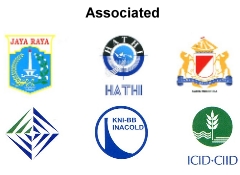Hubungi Kami
Plaza Golden Fatmawati (D' best) Blok J 8
Jl. RS Fatmawati 15, Jakarta 12420
Ph : +62-21-75916012 - 16
Fx : +62-21-75915802 - 03
Email : info@tgp.co.id
Web : www.tgp.co.id

Area Kerja Kami
- Capacity Building and Trainning Development
- Energy Development
- Environmental and Sanitation Development
- Infrastructure Development
- Transportation Development
- Water Resources Development
10 things to know about APEC Leaders Week in Manila
www.thejakartapost.com, 18 Nopember 2015

Leaders and ministers from the 21 APEC member countries have been gathering in Manila for the 2015 APEC Economic Leaders’ Week since Nov. 13, aiming to boost trade and inclusive, sustainable growth in the Pacific Rim.
Here are 10 points to help you understand what is on the agenda and why:
Economies in Transition:
A slowdown in trade growth is weighing on Asia-Pacific economies after a quarter century of fast trade growth that fueled the region’s development and transformed it into an engine for the global economy. Market volatility, pressure for protectionist policies, rising inequality, terrorism, pandemics and the effects of climate change are further challenges for the region, all highlighting the need for difficult structural reforms.
Opening new era of growth:
Greater market integration and development in the Asia-Pacific region has lifted hundreds of millions of people out of poverty and into the ranks of the middle class. This is creating enormous opportunities for businesses to sell their goods and services to consumers in the region and driving APEC members to push for new trade agreements and parallel measures to promote trade, environmental-friendly investment and sustainable growth.
Regional economic integration:
Leaders’ Week will convene all 12 Trans-Pacific Partnership (TPP) participants, 12 of the 16 countries negotiating the Regional Comprehensive Economic Partnership (RCEP) and three of four founders of the Pacific Alliance—all of which are APEC members. They will review their progress on the realization of the Free Trade Area of the Asia-Pacific (FTAAP), initiated by APEC Leaders in Beijing last November and co-chaired by China and the US.
New trade and investment frontiers:
APEC members will look to deepen their cooperation to ensure that all of them are equipped to tackle next generation trade and investment issues, facilitating their integration and optimizing its potential benefits across the region. Areas of focus range from complex policy fields such as intellectual property protection, government procurement and rules of origin, to enhancing internet and digital network development, data privacy protection and cyber security.
Service sector growth:
APEC members will seek to round out a new Services Cooperation Framework to provide an entry point for market liberalization and development within the sector, which has trailed that of manufacturing and could significantly increase productivity and job creation. Emphasis will also be on related work to open the sale of retail funds between economies through the Asia Region Funds Passport framework, facilitate travel and tourism, cross-border education and environmental services.
Tariff cuts for environmental goods:
Delivering on commitments made in Vladivostok in 2012 to cut tariffs on 54 environmental goods such as solar panels and wind turbines to five percent or less by the end of 2015 is another key aim. This would mark the first successful multilateral tariff-lowering arrangement in 18 years and free up trade in goods with a market value of US$ 500 billion globally while promoting environmental protection and green growth.
Small firms to benefit from trade:
Small and medium enterprises (SME) account for 97 percent of all businesses, 60 percent of GDP and half of all employment in APEC economies, but a low proportion of exports—less than 35 percent in Thailand and Vietnam, less than 25 percent in Indonesia, Japan, Malaysia, Singapore, Chinese Taipei and the US, and less than 15 percent in Australia, Chile and Peru. APEC members will set in motion a new action agenda for micro and SME participation in global markets.
Fighting inequality:
Empowering the people to keep pace with the changing economy and igniting productivity, job creation and wage growth will be a top priority. Emphasis is on promoting startup growth, entrepreneurship and strengthening human capital development, so that workforces are compatible with the market. APEC members will push for new structural reforms to make it simpler to start a business and navigate complex requirements like dealing with permits and enforcing contracts.
Mitigating climate change:
The global climate change conference is scheduled to take place in Paris a few weeks after the APEC Economic Leaders’ Meeting in Manila. APEC members in Manila have an opportunity to set the stage for greater progress in mitigating climate change as they work to meet their deadline to reduce tariffs on environmental goods. APEC member countries, which tend to be hit by about 70 percent of the world’s natural disasters, incurred more than US$ 100 billion annually in related losses over the past decade.
Connectivity and security:
As the volume of people and goods moving between Asia-Pacific economies climbs to new heights, it creates the need to bolster physical security and resilience in the region against the rising threats of natural disasters and cross-border terrorism. Further measures to bridge infrastructure gaps will be a focus of APEC members in Manila. Emphasis is on the facilitation of public-private partnerships to help meet the US$10 trillion in required project investment over the coming decade. (ags)
(Source: The Jakarta Post)
30 Januari 2026 - Di Balik Gedung Ikonik dan Proyek Raksasa, Begini Wajah Konstruksi Indonesia 2025
27 Oktober 2025 - Dirjen Migas Saksikan Penandatanganan Kontrak Manajemen Konstruksi Pembangunan DUSEM Segmen 1, Upaya Wujudkan Ketahanan Energi Nasional
23 September 2025 - IKN Menuju Ibu Kota Politik 2028, Ini Tahapannya


